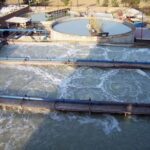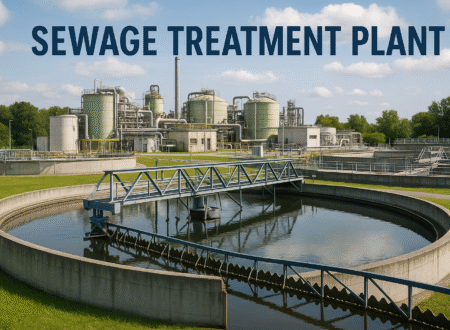Expert Solutions for Sewage Treatment Plant Installation in Noida
As urbanization accelerates and residential as well as industrial developments expand across the Delhi-NCR region, the need for effective wastewater management solutions has become more crucial than ever. In a growing city like Noida, where infrastructure and population are constantly increasing, efficient sewage treatment systems are essential to maintain hygiene, prevent water pollution, and ensure a sustainable environment.
This is where Sewage Treatment Plant Installation in Noida plays a key role. Implementing a properly designed sewage treatment plant (STP) not only helps manage wastewater efficiently but also ensures compliance with the National Green Tribunal (NGT) and Central Pollution Control Board (CPCB) norms. In this blog, we’ll explore the importance, process, technologies, and benefits of professional STP installation — and how choosing the right partner can make all the difference.
Understanding the Need for Sewage Treatment in Noida
Noida, a hub for residential societies, tech parks, manufacturing units, and educational institutions, generates thousands of liters of sewage water daily. Without proper treatment, this wastewater can lead to severe contamination of surface and groundwater sources, posing environmental and health hazards.
The primary purpose of a sewage treatment plant is to treat wastewater generated from domestic and commercial sources so that it can be safely reused or discharged. These plants use a combination of physical, chemical, and biological processes to remove contaminants and produce environmentally safe treated water.
For such a dynamic urban environment, Sewage Treatment Plant Installation in Noida is not just a regulatory requirement but a step toward sustainable living. Proper installation ensures that the system operates efficiently, meets environmental standards, and reduces long-term operational costs.
How Sewage Treatment Plants Work
A sewage treatment plant functions through a multi-stage process designed to purify wastewater before discharge or reuse. Let’s break down the key stages:
1. Preliminary Treatment
In this stage, large solids like plastics, rags, and grit are removed using screens and grit chambers. This prevents clogging and damage to downstream equipment.
2. Primary Treatment
The wastewater is allowed to settle in sedimentation tanks. Heavier particles settle at the bottom as sludge, while lighter materials like oil and grease float to the surface and are skimmed off.
3. Secondary Treatment
This is the biological treatment phase where microorganisms break down organic matter. The most common processes include:
- Activated Sludge Process (ASP)
- Moving Bed Biofilm Reactor (MBBR)
- Sequential Batch Reactor (SBR)
- Membrane Bio-Reactor (MBR)
These advanced technologies ensure effective removal of organic impurities and improve the quality of treated water.
4. Tertiary Treatment
To meet high-quality discharge standards, tertiary treatment includes filtration, chlorination, or UV disinfection. In some cases, this treated water is reused for gardening, flushing, or industrial cooling.
Key Steps in Sewage Treatment Plant Installation
Professional Sewage Treatment Plant Installation in Noida follows a systematic and well-engineered process. Below are the key steps involved:
1. Site Analysis and Feasibility Study
Before installation, experts analyze the available space, sewage generation capacity, and nature of wastewater. This helps determine the appropriate STP technology and capacity required for the location.
2. Design and Planning
A customized design is created based on the analysis. Factors like inlet characteristics, flow rate, and discharge norms are considered. The design ensures optimum performance and energy efficiency.
3. Equipment Procurement
All necessary equipment — tanks, blowers, diffusers, pumps, and electrical panels — are procured based on the design specifications. Using high-quality materials ensures long-term durability.
4. Civil Construction
This phase involves preparing the base and constructing the plant structure — including collection tanks, aeration tanks, and sludge drying beds — as per the approved layout.
5. Mechanical & Electrical Installation
Installation of pumps, motors, diffusers, blowers, and control panels is done carefully, ensuring all systems are properly aligned and tested for performance.
6. Commissioning and Testing
Once the physical setup is complete, the plant undergoes testing and commissioning to ensure smooth operation. Parameters such as Biological Oxygen Demand (BOD), Chemical Oxygen Demand (COD), and Total Suspended Solids (TSS) are checked.
7. Training and Maintenance
After installation, the operational team is trained to run and maintain the plant efficiently. Regular maintenance and performance audits help extend the life of the STP.
Advanced Technologies Used in Modern STPs
Today’s sewage treatment systems are smarter, more efficient, and environmentally friendly. Some of the popular technologies used in Sewage Treatment Plant Installation in Noida include:
- MBBR (Moving Bed Biofilm Reactor): Uses floating biofilm carriers for efficient biological treatment and low footprint.
- SBR (Sequential Batch Reactor): Operates in cycles to treat wastewater in batches, offering high flexibility and efficiency.
- MBR (Membrane Bio-Reactor): Combines biological treatment with membrane filtration for superior effluent quality, suitable for reuse.
- FAB (Fixed Aerated Bed): Ideal for medium-sized plants; uses fixed media for bacterial growth and stable operation.
These technologies not only improve treatment efficiency but also reduce manual intervention, maintenance, and energy consumption.
Why Professional Installation Matters
Installing an STP is not a simple plug-and-play process — it involves engineering expertise, environmental compliance, and operational know-how. Poorly designed or installed plants often lead to:
- Frequent breakdowns
- High operating costs
- Non-compliance with pollution control norms
- Inefficient treatment performance
Partnering with experts ensures that your Sewage Treatment Plant Installation in Noida is done in compliance with NGT and CPCB regulations. Professionals ensure correct sizing, superior design, and long-term reliability.
Regulatory Compliance for STPs in Noida
The Uttar Pradesh Pollution Control Board (UPPCB) mandates that all residential and commercial projects generating more than 20 KLD (Kilo Liters per Day) of wastewater must install a sewage treatment plant. The treated water should meet the prescribed discharge norms before being reused or released.
Moreover, the National Green Tribunal (NGT) has made STP installation mandatory for group housing societies, institutions, and industrial complexes. Non-compliance can result in hefty penalties or even closure orders.
Proper documentation, approvals, and regular monitoring are essential parts of compliance. An experienced installation partner ensures that every legal and technical requirement is met seamlessly.
Benefits of Installing a Sewage Treatment Plant in Noida
Installing a sewage treatment plant offers a wide range of benefits beyond compliance:
1. Environmental Protection
Treated water minimizes pollution of natural water bodies and reduces contamination of soil and groundwater.
2. Water Reuse
The treated water can be reused for gardening, toilet flushing, car washing, and other non-potable purposes — significantly reducing fresh water consumption.
3. Cost Savings
Recycling wastewater and reducing dependence on municipal water supply can lead to long-term savings on utility bills.
4. Enhanced Property Value
Residential and commercial projects equipped with functional STPs have higher market value and credibility.
5. Sustainability and CSR
Implementing wastewater treatment demonstrates a company’s commitment to sustainability and corporate social responsibility.
Challenges in STP Installation and How Experts Overcome Them
Despite its advantages, setting up an STP can present challenges like limited space, irregular sewage flow, and high operational costs. However, experienced professionals overcome these by:
- Using compact, modular designs for space constraints
- Implementing automated control systems for consistent performance
- Selecting energy-efficient equipment to reduce power consumption
- Offering AMC (Annual Maintenance Contracts) for hassle-free operation
By integrating modern design principles with smart automation, experts ensure smooth and cost-effective operation.
Maintenance and Upgradation of STPs
A sewage treatment plant requires routine maintenance to perform optimally. Key maintenance practices include:
- Periodic cleaning of tanks and aerators
- Monitoring BOD, COD, and pH levels
- Replacing worn-out media or diffusers
- Checking pumps, motors, and blowers for performance
- Scheduling sludge removal and disposal
As technology evolves, older plants can also be upgraded using modern systems like MBBR or MBR. This not only improves efficiency but also reduces energy and maintenance costs.
How to Choose the Right Partner for STP Installation
Choosing the right company for Sewage Treatment Plant Installation in Noida is crucial for long-term success. Here’s what to look for:
- Experience & Expertise:
Choose a company with proven experience in designing and installing STPs for residential, commercial, and industrial projects. - Technical Know-How:
Ensure the company offers advanced, efficient technologies suitable for your specific wastewater type and capacity. - Compliance Assurance:
The installer should be well-versed with CPCB, UPPCB, and NGT norms to ensure complete compliance. - After-Sales Support:
Look for providers who offer training, AMC, and technical assistance to ensure smooth operation. - Customization & Cost Efficiency:
The best partner will tailor solutions to your site’s unique requirements while optimizing cost and performance.
Sewage Treatment: A Step Toward a Greener Future
Efficient wastewater management is no longer optional — it’s a necessity for urban sustainability. Every building, complex, and industrial unit must play its role in conserving natural resources and reducing pollution. By adopting advanced sewage treatment systems, Noida can continue to grow while protecting its environment and public health.
The future of Noida’s water sustainability depends on responsible development and reliable wastewater treatment infrastructure. Investing in the right Sewage Treatment Plant Installation in Noida is an investment in a cleaner, greener tomorrow.
Conclusion
When it comes to effective wastewater management, precision and expertise matter. Professional installation ensures long-term reliability, regulatory compliance, and sustainable performance. Whether you’re setting up an STP for a housing society, commercial complex, or industrial unit, always trust experts who combine technology with experience.
For reliable and comprehensive solutions, Shri Balaji Aqua stands out as a trusted name in water and wastewater management. With years of expertise, advanced technologies, and a commitment to sustainability, the company provides end-to-end services for Sewage Treatment Plant Installation in Noida — from design to commissioning and maintenance.
If you’re planning to install or upgrade your STP in Noida, Shri Balaji Aqua is your perfect partner for expert, efficient, and eco-friendly solutions.
(FAQs)
1. Why is Sewage Treatment Plant Installation in Noida important?
Sewage Treatment Plant Installation in Noida is essential to manage the growing volume of wastewater generated by residential societies, commercial buildings, and industries. It ensures proper treatment of sewage before discharge, prevents environmental pollution, and helps meet the strict norms set by the Central and State Pollution Control Boards.
2. What factors should be considered before installing an STP in Noida?
Before installation, factors such as sewage generation capacity, available space, type of wastewater, flow rate, and discharge requirements must be evaluated. A feasibility study and customized design ensure that the STP operates efficiently and meets all regulatory standards.
3. What are the most commonly used technologies for sewage treatment plants in Noida?
Modern sewage treatment plants in Noida commonly use technologies like MBBR (Moving Bed Biofilm Reactor), SBR (Sequential Batch Reactor), and MBR (Membrane Bio-Reactor). These systems are energy-efficient, compact, and deliver high-quality treated water suitable for reuse in gardening or flushing.
4. How much time does it take to complete Sewage Treatment Plant Installation in Noida?
The installation timeline depends on factors such as plant capacity, technology used, and site conditions. Typically, a small-to-medium STP can take between 45 to 90 days for complete installation, including design, construction, and commissioning.
5. Who provides the best Sewage Treatment Plant Installation in Noida?
Shri Balaji Aqua is a trusted name for professional and efficient Sewage Treatment Plant Installation in Noida. With extensive experience in water and wastewater treatment, the company delivers customized, cost-effective, and environmentally sustainable solutions for residential, commercial, and industrial projects.




